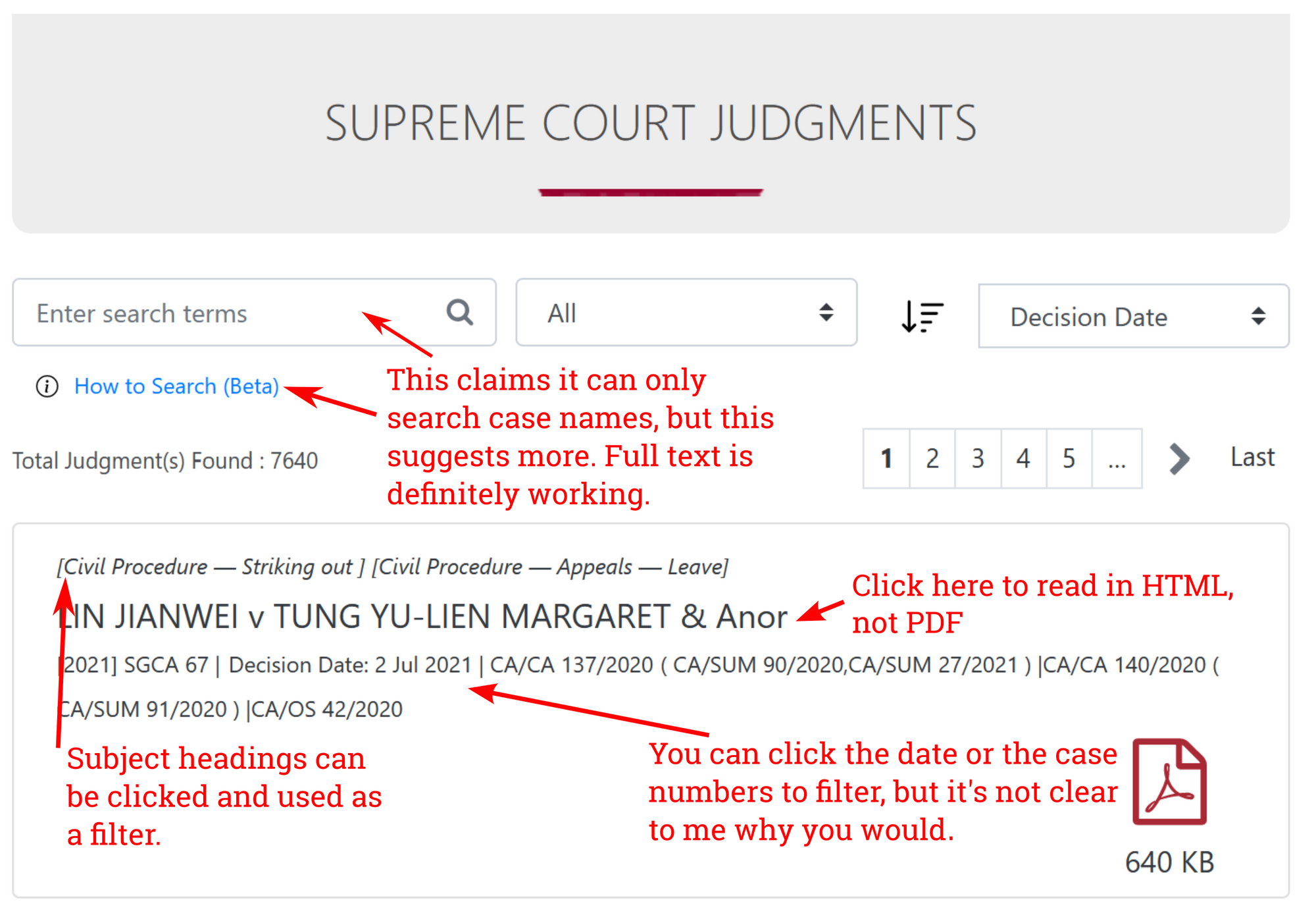New homes for judgements in the UK... and Singapore?
Ever since I was a law student, I loved BAILII, as well as its international counterparts AustLII and CanLII. This was in the previous decade, where such free sources were still a work in progress. So what if they were ugly? It was free and spared me a trip to the library. Over the years, they have certainly improved. You can still see the echoes of the previous century in the website design of BAILII, but its scope has expanded immensely. You can now read leading cases by subject there, just like a law student.
So, I was impressed when I read that court judgements in the UK will get a new home. BAILII will continue, but I would think the accessibility of such resources would be more secure now that the UK government is behind it.
But this post isn't really about BAILII or the UK. It's about the Singapore Supreme Court judgements page.
Supct | Supreme Court Judgmentslogo

Sneakily, the Singapore Supreme Court judgements went down about two weekends ago while I was deciding how to write this post. It appeared that an iframe on the webpage was misconfigured. It was odd and foreboding. What happened? I panicked. Is this the last time I would get free access to the Supreme Court judgements?
The mystery was solved a few days later — the page is now “enhanced” by CrimsonLogic. So the judgements are now served from the eLitigation website, which is the filing system for the Singapore Courts. If you ignore the different domains, the site now has better search capabilities and the ability to read judgements on a web page rather than PDF. Oh, the icons look cuter as well.

The conversion of PDF judgements to HTML is significant to me. My nightmares converting judgement PDFs to text for machine learning are well-documented on this blog. The conversion appears quite direct with the headers and footers removed. I hope this is fully automated because more work is then required to convert the judgement again for LawNet, now with metadata added and PDF artefacts removed.
This page, however, still remains the most frequently updated page for Supreme Court judgements. Instead of reading clunky PDFs, I can now read them in HTML. The search function is also more powerful. As the archive now goes back to 2000 (including unreported judgements), this resource will probably be the best way to freely access Supreme Court judgements here. It might even rival LawNet for most purposes.
Now that the page is more powerful, it makes the secrecy about it even more confounding. From a UX viewpoint, the way results are displayed make it look like a PDF is the only way to read them. The hint to the search box still suggests that you can only search case titles. Why improve something if you're not going to show it off?!
_ Update 9 August 2021 : I complained about the UX but it looks like it's now corrected. The not so reliable HTML is the main way to access the judgements on the site, while the PDF is hidden in a download PDF button at the top when you view the judgement itself._
This brings us back to BAILII and the UK. As the commentary clarifies, the goal is greater access to justice. Greater access to justice means that judgements are not only accessible to lawyers but to students, researchers, litigants in persons, the media and even the momentarily curious.
My most striking takeaway from the news in the UK is that perhaps the Judiciary or the Attorney-General's Chambers are not the best bodies to provide judgements or legal materials to the general public. In the UK, the National Archives are now in charge (they already do the legislation), and they have the infrastructure and expertise to do this for a large audience.
In Singapore, we hide such pages in the media section. The media would like to have the latest judgements (probably), but we also pack more than 7500 judgements somewhere on the website. We improve the website but don't tell anybody about it. Judgements appear to be converted from Microsoft Word to PDF format, then to HTML, and maybe XML format. Quite frankly, I don't know what all this is for or where it's going.
And this is the Supreme Court, the highest court in the land.

- Discuss... this Post
- If you found this post useful, or like my work, a tip is always appreciated:
- Follow this blog on the Fediverse [Enter the blog's address in Mastodon's search accounts function]
- Contact me:

